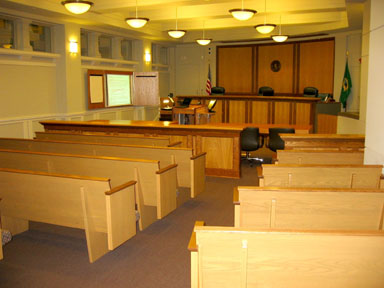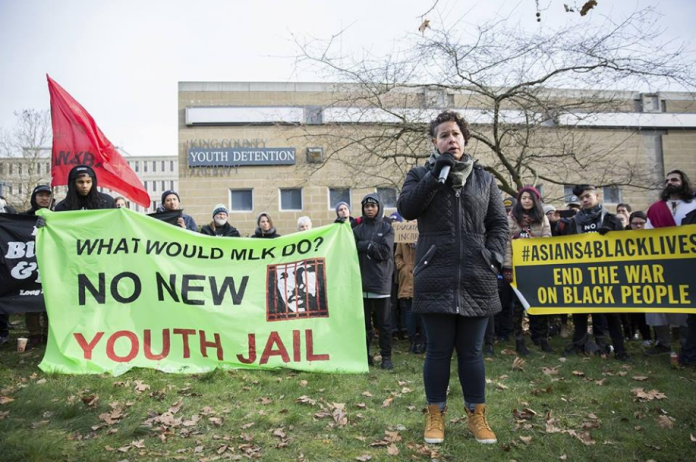Tuesday was an eventful day for the future of the King County Children and Family Justice Center after the Washington State Court of Appeals (Division Two) ruled in favor of Ending the Prison Industrial Complex (EPIC). EPIC contended that the 2012 King County ballot amendment that provided $210 million in funding for the facility did not properly disclose and calculate its financing plan. The ruling could erase roughly $150 million from the project’s budget, EPIC’s attorney Knoll Lowney said.
“We don’t know for sure, but our sense is that it would take away well over half–probably more like $150 million of the $210 [million], if not more,” Lowney said.
Later the same day, King County served the City of Seattle and EPIC (additionally naming 60 other social justice group that signed the appeal) with a lawsuit to block an appeal of the project’s master use permit. The Seattle Department of Construction and Inspections (SDCI) granted the master use permit in December 2016. We covered the bill passed by city council that allowed appeal of the master use permit here. Lowney downplayed the importance of the County’s complaint, which may have been an “effort of intimidation,” he said.
“The same issues are already on appeal before the Court of Appeals Division One,” Lowney said. “While it’s offensive that the County sued all these other entities, they’ve now said they’re going to amend their complaint to drop them and leave only EPIC as a party.”
If completed, the new facility would host a 156-bed juvenile detention center in Seattle’s Central Area (along with 10 courtrooms) and replace an older facility downtown the County argues is decrepit and unsafe. The ruling invalidated a portion of levy, because the ballot language did not specify it was building off the previous levy rate. Forging ahead with the new facility without the now disqualified funds would potentially jeopardize other King County budget priorities.
If it means what we think it means, I'm in awe of .@EPICseattle. They embody Persistence. Power.Justice.Righteousness.Fearlessness.
— Tammy J. Morales (@TammyMoralesSEA) September 26, 2017
Asha Heru, an EPIC member and anti-racist organizer, released the following statement.
“My confidence in the judiciary systems has never been strong,” Heru said. “It’s been my observation that justice is not determined by those who live just lives, by those who are more concerned with the maintenance of power as it is, than transforming their relationship to it for the benefit of all people, especially those who have been impacted by the lack of honesty in the court system. This decision is unexpected but from the beginning we’ve been adamant that this jail will not be built. Incarcerating youth does nothing but harm the child more. I’m elated that the court of appeals has looked at this case with reason and integrity, the morality in this decision is admirable.”
Meanwhile, Crosscut’s David Kroman reported King County is forging ahead to finish the controversial juvenile detention center:
In a statement, Director of King County’s Facilities Management Division Anthony Wright said the county just received the ruling and “we are reviewing it for any potential impacts to the Children and Family Justice Center (CFJC) project. The City of Seattle issued a Master Use Permit to build the facility in December 2016, and construction is underway. The current plan is to move forward without construction delay until the center’s scheduled opening in 2019.”

King County optimistically framed the ruling as a minor setback. “Anthony Wright, director of the county’s Facilities Management Division called it a ‘technical ruling regarding the method for levy collection,'” Mike Lindblom reported in The Seattle Times.
While the levy collection method was invalidated, the Court of Appeals ruled that the vague ballot language–which didn’t mention a jail or juvenile detention–was legally permissible. That means the ballot measure remains valid and in effect, minus the miscalculated funding. The appeal remands the case to the lower court with the Children and Family Justice Center’s finances in a cloud of uncertainty. The King County Facilities Management Division has yet to respond to my requests for comment.
“We always were confident that we would find a way to stop this misguided project,” Lowney said in a press release. “King County and Seattle pride themselves on being progressive, and it was unconscionable that the County is seeking to build a new jail to expand incarceration of Black and Brown kids. By defeating this project, we can focus our resources on solutions that work for kids in trouble.”
Featured image of a No New Youth Jail protest is courtesy of EPIC.
Doug Trumm is publisher of The Urbanist. An Urbanist writer since 2015, he dreams of pedestrian streets, bus lanes, and a mass-timber building spree to end our housing crisis. He graduated from the Evans School of Public Policy and Governance at the University of Washington in 2019. He lives in Seattle's Fremont neighborhood and loves to explore the city by foot and by bike.






